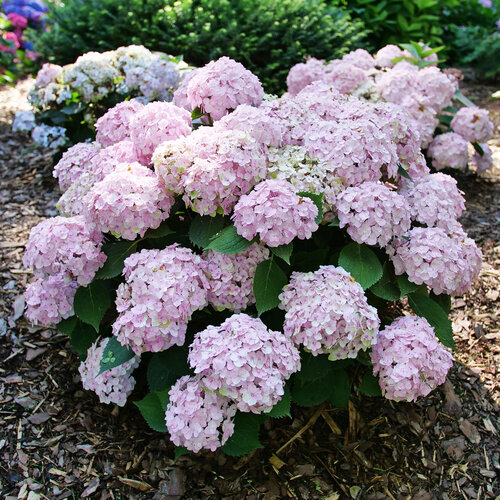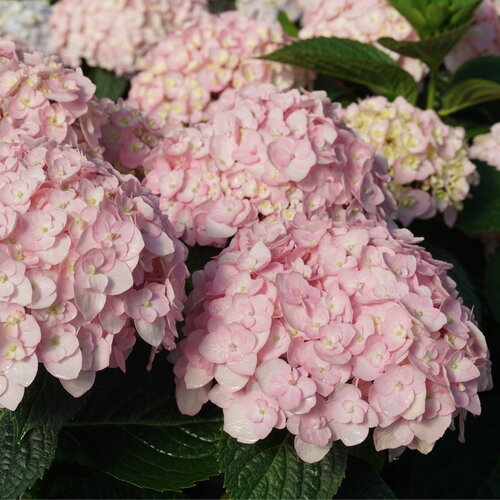Wee Bit Innocent® Bigleaf Hydrangea Hydrangea macrophylla
- Part Shade
- Sun
- Summer
This plant is hardy in zones 5 - 9
Zones are based on the average annual extreme minimum temperature an area is expected to receive during the winter. They are used to determine whether a plant is likely to be perennial in your area. If the number in the green box below is within the zone range listed for the plant, it will be hardy for you and thrive in your climate.
- 5
- 6
- 7
- 8
- 9
What is my hardiness zone?
NORTH BAY, ONTARIO
ZONE 4
-
DETAILS
FEATURES
If soft colors are the foundation of your garden palette, you will love Wee Bit Innocent™ hydrangea. Its lush mophead blooms fill with pastel pinks, blues, and purples. It is a soft, pillowy place for your eyes to rest in the summer garden. It even reblooms a bit in the fall! You’ll get to enjoy the intricate doubled florets for months.
Top reasons to grow Wee Bit Innocent hydrangea?
- Pastel coloring is unusual for a hydrangea
- Compact habit
- Interesting doubled flowers
Continuous Bloom or RebloomerDisease ResistantLong BloomingSmall or MiniatureCHARACTERISTICS
Plant Type:ShrubShrub Type:DeciduousHeight Category:ShortGarden Height:24 Inches 61cmSpacing:30 Inches 76cmSpread:30 Inches 76cmFlower Colors:BluePinkPurpleFlower Shade:Pale pink in neutral to alkaline soils; light blue or purple in acidic conditionsFoliage Colors:GreenFoliage Shade:GreenHabit:MoundedContainer Role:ThrillerPLANT NEEDS
Light Requirement:Part ShadeSunThe optimum amount of sun or shade each plant needs to thrive: Full Sun (6+ hours), Part Sun (4-6 hours), Full Shade (up to 4 hours).
Maintenance Category:EasyBlooms On:Old WoodBloom Time:SummerHardiness Zones:5a, 5b, 6a, 6b, 7a, 7b, 8a, 8b, 9a, 9bWater Category:AverageSoil Fertility Requirement:Fertile SoilUses:Border PlantContainerCut FlowerDried FlowerLandscapeMass PlantingSpecimen or Focal PointUses Notes:Landscapes, perennial gardens, low hedges - big-leaf hydrangeas are versatile garden plants for anywhere you need some summer color.
Maintenance Notes:Big-leaf hydrangeas cannot be pruned at any point in the year without negatively impacting the flowering. As such, it's best to avoid pruning this type of hydrangea altogether. If portions of the plant were damaged from winter weather, they can be removed in spring when it is clear where the new growth is emerging.
The key to getting reblooming hydrangeas to produce new-wood flower buds is to keep them growing vigorously all summer. Apply a granular rose fertilizer in early spring, when the ground has thawed, and again in late spring. Never fertilize after late July; that can interfere with the plant going dormant.
The "default" color for big-leaf hydrangeas tends to the pink/red tones, and that is the color they will display in neutral (pH 7.0) or higher soil. The soil must be acidic (at least 6.5 or so) for the blue color to develop, and aluminum, a naturally occurring soil mineral, must be present. If you are not satisfied with the flower color in your yard, get a soil test so that you know exactly what must be changed. We do not recommend applying any kind of treatment "just in case" - that's a waste of time and money, and could potentially lead to pollution or create inhospitable conditions in the soil.
Wee Bit Innocent™ Hydrangea macrophylla 'SMNHMC' USPP 35,815, Can PBRAFPICTURES AND INFORMATION COPIED FROM PROVEN WINNERS



